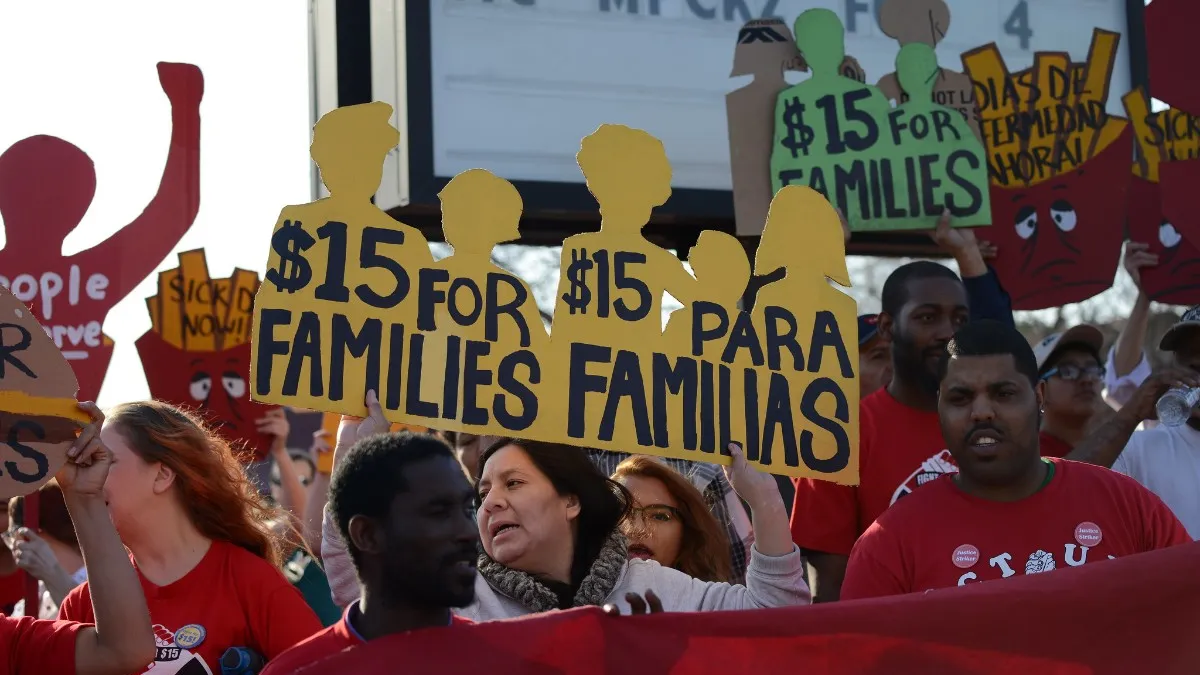Dive Brief:
- In a protest over wages, McDonald's employees in 15 cities are planning to strike on May 19, a day before the company's annual shareholder meeting, according to Vice. The employees are part of the Fight for $15 movement demanding that McDonald's raise its wages to at least $15 an hour.
- In an emailed statement, McDonald's said, "Our first responsibility is to hardworking restaurant crew, and we respect and appreciate their dedication to serve millions of customers daily. It's the responsibility of federal and local governments to set minimum wage, and we're open to dialogue so that any changes meet the needs of thousands of hardworking restaurant employees as the 2,000 McDonald's independent owner/operators who run small businesses."
- The strike comes as the restaurant industry faces a massive labor shortage. McDonald's is one of several chains that have facilitated hiring events in a bid to add thousands of employees as the segment begins to recover from the COVID-19 pandemic. Whataburger, Taco Bell, Sonic and KFC have also gone on such hiring sprees in recent weeks.
Dive Insight:
McDonald's has become a bigger part of the wage conversation in recent years, which is notable as the largest chain by sales in the U.S. and as a mostly franchised restaurant model. In 2019, McDonald's stopped lobbying against federal minimum wage increases.
In January, McDonald's CEO Chris Kempczinski told investors the company is doing "just fine" in the 29 states that have increased wages, and analysis by a team of economists found that higher wages have not led to closures, job loss or increased automation at the chain.
During its Q1 earnings call on April 29, McDonald's USA President Joe Erlinger said the company is "working through what some changes in [its] company-owned restaurants might look like from a wages and compensation perspective."
But the company has also been criticized for its approach to wage increases. Although McDonald's announced it would stop lobbying Congress against federal wage increases, for example, the company is still part of the National Restaurant Association and the International Franchise Association, both of which continue to lobby against a federal minimum wage increase, according to Vice. In February, NRA wrote that the Raise the Wage Act was "the wrong proposal at the wrong time for the restaurant industry."
Also, in February, Vice reported that McDonald's has been monitoring employees' social media to find out if they're active in the Fight for $15 campaign. McDonald's called the report "inaccurate and misleading."
Other chains have committed to a $15 wage, including Starbucks and as of this week, Chipotle has announced it will raise its average hourly wage from $13 to $15. These two chains are 100% company owned, which gives them full control over such decisions, regardless of market. Conversely, McDonald's is about 93% franchised, which puts labor decisions squarely in the hands of its independent owner/operators. That adds complexities based on market conditions and disparate profit margins.
Still, a franchised model won't matter if President Joe Biden's goal of raising the minimum wage to $15 by 2025 comes to fruition. It also doesn’t seem to matter now to employees, either. As one McDonald's worker told Vice, the company made $5 billion in profits last year and doesn't have to wait on legislation to increase pay.
Employee strikes in the quick-service segment are nothing new. The Fight for $15 Movement was created in 2012 and has facilitated several such events around the country and the globe since. The debate over wages has been growing as 29 states and Washington, D.C., have now voluntarily moved beyond the $7.25 federal minimum wage put into place in 2009. That debate reached a fever pitch during the pandemic, however, as QSR workers were deemed essential and put at high risk for contracting COVID-19.
As such, employees have filed a bevy of COVID-19-related OSHA complaints, and several strikes have been held throughout the past year demanding that essential status come with higher wages.













